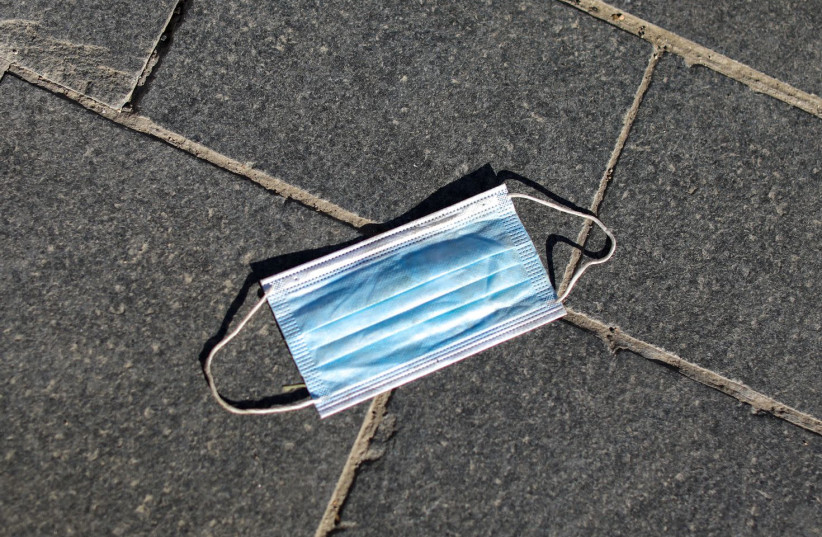Consider the following snapshots from our mid-2022 coronavirus reality show.
COVID is over. So many people have been infected that the end must be near. Or maybe it’s not, since Omicron’s evil stepchildren (the BAs) can reinfect us all – potentially, according to some reports, just a couple of months after a first bout.
A judge in Florida struck down the US government’s mask mandate on public transportation. Flight attendants were shown in videos gleefully collecting masks, chanting, “Wave ’em in the air like you just don’t care.” Passengers were equally jubilant – except for those who were caught psychologically unprepared for what’s being dubbed the “choose your own adventure” phase of the pandemic. Israel will end its own mask requirement on international flights leaving the country next week.
Masks on or off, Israel halted PCR testing for visitors – Israeli citizens and tourists – at Ben-Gurion Airport as of today, May 20. Yet, by mid-April, nearly 4,000 tourists caught Covid while in Israel. How will we stop future spreads without testing?
It’s enough to give even the most casual observer whiplash or, in the spirit of the day, “pandemilash.”

I get it, I do. The last two plus years of COVID-19 restrictions have been characterized by rules that zig every time the virus zags. Let’s not forget how Israel dropped its indoor mask mandate in 2021 – for all of two weeks before Delta came raging in and the requirement was quickly reinstated.
Are we making the same mistake this time? Or has something profoundly changed – vaccines that prevent severe cases and hospitalization; treatments like Paxlovid, Evusheld and monoclonal antibodies; a (currently) less virulent variant – that means we can lighten up and live with the virus?
I’m not immune to the joys of shopping mask-less or eating out in restaurants indoors. Once you’ve gotten COVID, as my entire family has now, you tend to feel invincible, like a protein spiky superhero. I had resigned myself to wearing a mask indefinitely, but in the last few weeks, I’ve been to parties, art exhibits, even ridden on public transit – all without my Sonovia. It’s felt fabulous.
After all, “What’s more fun than coming to a holiday celebration, without masks?” asked Prof. Yehuda Adler, an expert in cardiology and internal medicine, before adding the caveat: “I think that [the authorities] acted too soon.”
Part of the dilemma is that those of us who’ve had COVID know better what to expect. It’s true that the next time could be very different, but it seems my body can in fact mount a reasonable defense, such that COVID will unlikely be fatal – for me at least. (Long COVID is another worry entirely.)
As a result, the idea of getting reinfected has gone from being an existential terror to a minor, albeit nontrivial, annoyance.
Let me be clear: I absolutely don’t want to get reinfected. Researchers at Imperial College London and the University of Cambridge have found that serious cases can lead to a decrease in IQ of up to 10 points – equivalent to 20 years of aging!
But I’m feeling pretty confident that if I do get corona again – and unless it’s while traveling in a country where I might not have access to the most potent antivirals – it won’t fell me.
Or as Dr. Anthony Fauci put it, “Things are looking good. We don’t want to get overconfident, but they look like they’re going in the right direction.”
Still, I can’t shake the nagging feeling that I may be putting myself (and others) at unnecessary risk, even as I follow the Health Ministry’s most recent regulations.
“Nobody is going to be able to tell us what will happen,” Anne Rimoin, an epidemiologist at UCLA, told The New York Times. “The ending is not written yet.”
“When you’ve got something as transmissible as Omicron, you don’t need it to be incredibly severe to really screw things up,” warned Bill Hanage, a public health researcher at the Harvard T.H. Chan School of Public Health.
Or as Kate Cagney, the director of the Institute for Social Research at the University of Michigan, said in an interview with Vox, “We don’t have a consistent algorithm that we’re all following.”
PERHAPS THE biggest cause of the “pandemilash” so many of us are experiencing is the sudden shift from concern for the common good to an attitude of “what’s in it for me?”
That shouldn’t be so surprising.
Anti-maskers have long positioned this as a question of personal liberty. That is, if one is not personally at risk, why wear a face covering at all?
The official attitude has transitioned from an initial approach of “avoid infection at all costs” to “getting infected is a largely acceptable risk of getting life back to normal,” wrote Dylan Scott in Vox.
Even the US Centers for Disease Control website has revised its guidance. “Wear a mask with the best fit, protection and comfort for you” (emphasis mine), the CDC website states.
When Washington Post columnist Kate Cohen was recovering from her own COVID infection, she asked a health department employee when it would be safe for her to be around others.
“Use your conscience,” the worker said with a shrug.
“I wish I didn’t have to,” Cohen wrote. “But without a mandate to make us act out of concern for others, conscience is all we’ve got.”
Unfortunately, it’s our sharply divergent consciences that got us into the “pandemilash” we’re in today.
The writer’s book, Totaled: The Billion-Dollar Crash of the Startup that Took on Big Auto, Big Oil and the World, is available on Amazon and other online booksellers. brianblum.com
